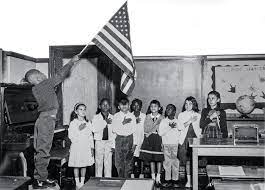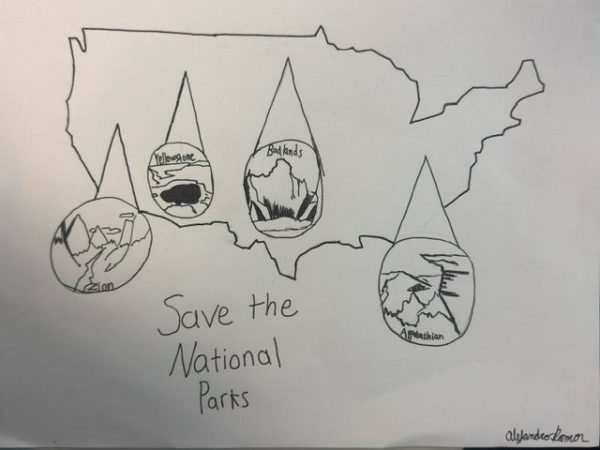The Pledge of Allegiance: Outdated?

Kids in 1963 standing for the Pledge of Allegiance in a Chicago school
Every single American student has heard the Pledge of Allegiance every single day they’ve been in school since kindergarten, but does that mean that it needs to continue?
I feel that the Pledge of Allegiance should still be said in schools because some people stand and say it. The pledge could mean a lot to a person for one reason or another, and everyone’s entitled to their own opinion and beliefs.
Unfortunately, there are quite a few problematic components of the Pledge of Allegiance. For example, the Pledge mentions “God”, which is a direct breach of the separation of church and state, and is also problematic for those who believe in a different god (or gods) or just aren’t religious. Also, despite the “with liberty and justice for all” in the Pledge, there isn’t liberty and justice for all. There’s liberty and justice for some, as long as you’re male, caucasian, heterosexual, cisgender and you were born in the United States.
In addition to this, when Francis Bellamy, a socialist, originally wrote the Pledge in 1892. He had originally considered including the values of equality and fraternity into the recitation, but he was discouraged from doing so, since not too many people were keen on the idea of equal rights for women and people of color. Because of this, the inclusion of those values would have been too controversial. Thus, by excluding those values, the Pledge as it appears today reflects less-than-subtle invidious attitudes of racism and sexism, which in and of itself is reason enough to pass on participating in it.
In 1943, before “under God” was added to the Pledge of Allegiance (this was added to distinguish America from communist-led countries), the United States Supreme Court voted that students in public schools have a right to not participate in the Pledge of Allegiance after 9-year-old Gathie Barnett and 8-year-old Marie Barnett were expelled from Slip Hill Grade School near Charleston, South Carolina. The Barnett children and their parents were Jehovah’s Witnesses, and the girls got the idea from their father, Walter Barnett, who listened to Jehovah’s Witness leader Joseph Rutherford, who warned against saluting the flag as tantamount to worshipping graven images in violation of biblical commands in the book of Exodus.
The family was the “Barnettes” (a court clerk had misspelled the family’s surname) in the U.S. Supreme Court decision West Virginia Board of Education v. Barnette in October 1942, in which the Court struck down a West Virginia law that required public school students to stand, salute the American flag and recite the Pledge of Allegiance.
So, thanks to the Barnetts, it is no longer a requirement to stand, and our generation’s teenagers took this and ran.
In my classes, most of which have about 25 kids, and in many others, there are maybe 2 or 3 people who stand and participate in the Pledge of Allegiance each morning, and for some classes, it’s less. This may come as a shock to most adults, especially those of which stood for and said it every morning throughout their whole childhood. However, for our generation, it’s normal for people not to stand. Even when I was in middle school, it was less extreme, but still, not everyone stood.
Of course, people are going to have different views on the Pledge of Allegiance, depending on who they are as a person and their history and views.
Even throughout H-F, people have different views on what the Pledge of Allegiance means to them.
“I would not mind if they stopped saying the pledge because it’s not really something I look forward to every day,” sophomore Violet Quirke said. However, on the opposite side, freshman Mitchell Niemiec feels that “Continuing to say the pledge in the morning for those that still wish to stand for it is the best way to find a medium between those who want to stand and those who don’t,”
In addition to this, people also have different ideas as to what sitting for the Pledge truly means, to them and just in general.
“I do not find it disrespectful to sit during the pledge, but it is disrespectful if someone talks a lot during it or mocks other people who do choose to stand for the pledge. Everyone has their own set of beliefs and practices, and as long as we respect each other’s choices, there should be no issue…” sophomore Emma Steiner. In addition to this, freshman Graham Harris says that “I don’t find it disrespectful to sit during the pledge because it’s a choice we get to make, and shouldn’t be any more of a deep-seated issue.”
So while some people stand and some people sit, the slightly problematic Pledge of Allegiance should still be recited in schools today because everyone is entitled to their own practices.





